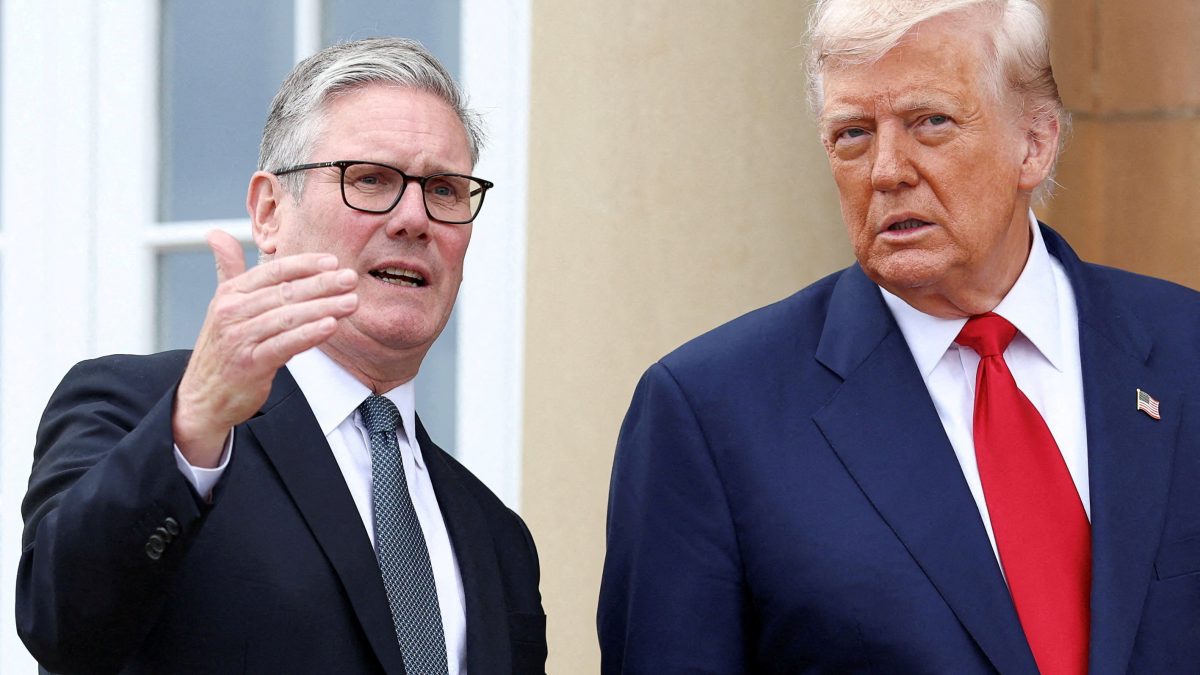After a day of royal pageantry and pomp at Windsor Castle, US President Donald Trump and British Prime Minister Keir Starmer turn on Thursday to the serious business of global politics and trade.
Their meeting at Chequers comes on the heels of an eye-catching £150 billion ($205 billion) package of US investment into Britain, spanning technology, energy and life sciences. But beyond the announcements, thorny issues await. Here are five things to watch out for:
1. Trade talks: Steel, aluminium and “Liberation Day” tariffs
Britain was the first country to escape the so-called “Liberation Day” tariffs Trump slapped on allies, marking an early win for Starmer’s strategy of engagement. But the real test now lies in steel and aluminium. London has pressed Washington to cut the 25 per cent tariffs still in place on these metals. Trump has offered little more than a “we’ll talk to them”.
The new investment pledges—from Microsoft’s £30 billion commitment to AI and energy to Blackstone’s £90 billion pipeline of projects—allow Starmer to argue Britain is an indispensable partner.
Yet without progress on tariffs, domestic critics may see the special relationship as one-sided. For Trump, the optics of protecting US industries remain politically useful, meaning a breakthrough is unlikely.
2. War in Ukraine: To talk or act against Russia?
Ukraine will dominate the foreign policy portion of talks. Starmer, who has styled himself as a bridge between Trump and Europe, hopes to stiffen US resolve against Russia’s invasion. Trump has recently called Russia “the aggressor,” pleasing European allies.
However, Trump has largely been seen as reluctant to take big punitive measures against Russia. He has tied further American actions against Moscow to Europe halting all purchases of Russian oil.
This creates a delicate balancing act. Starmer must push Trump for tangible support to Kyiv while avoiding conditions that split Europe. At the same time, Starmer will be eager to show that Britain remains at the centre of transatlantic strategy. A lukewarm outcome risks reinforcing European fears that Trump sees the war less as a battle for democracy and more as a transactional bargaining chip.
Impact Shorts
More Shorts3. Gaza war: Charm offensive meets Palestinian recognition
After charming Trump with warm words and royal hospitality, Starmer may pivot to one of his boldest foreign policy commitments, which is, recognition of a Palestinian state. His Labour government has long argued recognition is key to advancing peace and pressure is mounting at home to take the step.
Trump, however, has warned that recognition risks “rewarding Hamas,” though he has said he doesn’t mind Starmer “taking a position”. That phrasing suggests tolerance, not support.
With Gaza under ongoing assault and Netanyahu’s war cabinet defiant, the UK and US could find themselves at odds. For Starmer, this is not just about West Asia peace—it’s also about showing independence from Washington’s line. The question is whether he can press the case without straining the special relationship.
4. Nato’s future: Between withdrawal and strengthening
Another fraught area is Nato. Trump has long criticised the alliance, at times threatening to walk away unless European allies increase their defence spending. His instincts remain sceptical of multilateral commitments. Starmer, meanwhile, is firmly committed to strengthening Nato as Europe’s cornerstone of security.
The two leaders may find limited common ground in calls for European allies to spend more, but divergence looms over the bigger picture. If Trump floats withdrawal scenarios, Starmer will have to reassure both domestic and European audiences that Britain can keep Washington anchored.
Nato’s credibility hinges on whether the US will remain a reliable partner. Starmer’s challenge is to pull Trump closer to that role.
5. China: The elephant in the room
China could prove the most difficult issue. Trump has suggested Europe, including the UK, must impose tariffs as high as 50 per cent or 100 per cent on imports from China for continuing to buy Russian oil. For Britain, heavily reliant on global trade, such measures risk economic blowback.
Starmer may test Trump’s red lines here. Reports suggest the prime minister is preparing a phone call with Chinese President Xi Jinping to keep channels open, even as Washington pushes confrontation.
Britain is likely to weigh its role as a US ally against its own economic interests. How far Trump will press the UK to align with his tariff crusade will be closely watched in European capitals.
Beyond the agenda: Nigel Farage and US Right-wing influence
Amid the official agenda, one undercurrent is Starmer’s desire to keep America’s right wing from meddling in UK. politics. Nigel Farage’s rising challenge at home is fuelled in part by ideological kinship with Trump-aligned Republicans.
Starmer may be tempted to discreetly press Trump to rein in overt support for British populists. Whether Trump complies is uncertain—he has praised Farage before. Yet for Starmer, managing this risk is essential to preserving political stability in Britain.
A relationship of gains and gambles
The Trump–Starmer meeting marks a turning point. Both leaders see the value of showcasing a “special relationship” bolstered by massive investment pledges. But beneath the headlines lie sharp divergences: tariffs unresolved, Ukraine strategy unsettled, Gaza policy clashing, Nato’s future in doubt, and China looming.
For Starmer, the task is to extract concessions without alienating Washington. For Trump, it is about proving his second presidency brings global weight. After the carriages, banquets, and photo ops, today’s Chequers talks will test whether two leaders with starkly different instincts can align—or whether the pomp of Windsor will give way to politics as usual.
)